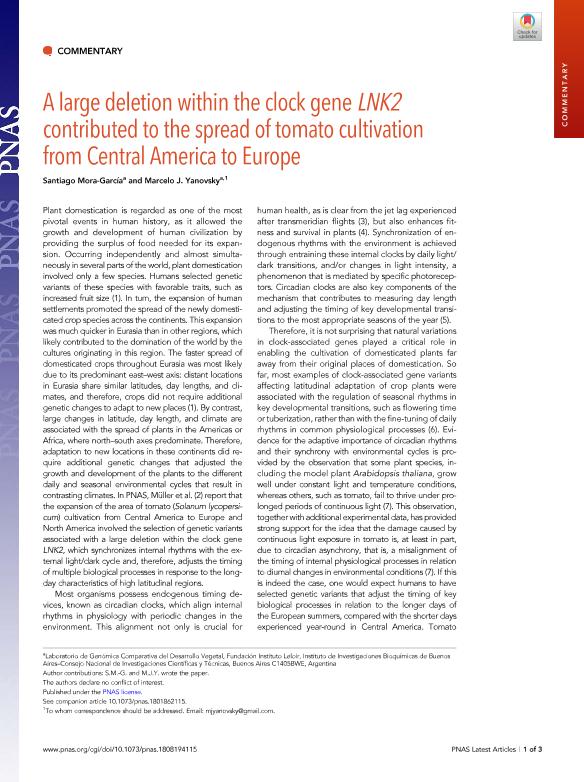Mostrar el registro sencillo del ítem
dc.contributor.author
Mora Garcia, Santiago

dc.contributor.author
Yanovsky, Marcelo Javier

dc.date.available
2019-12-13T19:34:04Z
dc.date.issued
2018-07
dc.identifier.citation
Mora Garcia, Santiago; Yanovsky, Marcelo Javier; A large deletion within the clock gene LNK2 contributed to the spread of tomato cultivation from Central America to Europe; National Academy of Sciences; Proceedings of the National Academy of Sciences of The United States of America; 115; 27; 7-2018; 6888-6890
dc.identifier.issn
0027-8424
dc.identifier.uri
http://hdl.handle.net/11336/92209
dc.description.abstract
Plant domestication is regarded as one of the most pivotal events in human history, as it allowed the growth and development of human civilization by providing the surplus of food needed for its expansion. Occurring independently and almost simultaneously in several parts of the world, plant domestication involved only a few species. Humans selected genetic variants of these species with favorable traits, such as increased fruit size (1). In turn, the expansion of human settlements promoted the spread of the newly domesticated crop species across the continents. This expansion was much quicker in Eurasia than in other regions, which likely contributed to the domination of the world by the cultures originating in this region. The faster spread of domesticated crops throughout Eurasia was most likely due to its predominant east?west axis: distant locations in Eurasia share similar latitudes, day lengths, and climates, and therefore, crops did not require additional genetic changes to adapt to new places (1). By contrast, large changes in latitude, day length, and climate are associated with the spread of plants in the Americas or Africa, where north?south axes predominate. Therefore, adaptation to new locations in these continents did require additional genetic changes that adjusted the growth and development of the plants to the different daily and seasonal environmental cycles that result in contrasting climates. In PNAS, Müller et al. (2) report that the expansion of the area of tomato (Solanum lycopersicum) cultivation from Central America to Europe and North America involved the selection of genetic variants associated with a large deletion within the clock gene LNK2, which synchronizes internal rhythms with the external light/dark cycle and, therefore, adjusts the timing of multiple biological processes in response to the long-day characteristics of high latitudinal regions.
dc.format
application/pdf
dc.language.iso
eng
dc.publisher
National Academy of Sciences

dc.rights
info:eu-repo/semantics/openAccess
dc.rights.uri
https://creativecommons.org/licenses/by-nc-sa/2.5/ar/
dc.subject
Crop Domestication
dc.subject
Circadian clock
dc.subject
Tomato
dc.subject.classification
Bioquímica y Biología Molecular

dc.subject.classification
Ciencias Biológicas

dc.subject.classification
CIENCIAS NATURALES Y EXACTAS

dc.title
A large deletion within the clock gene LNK2 contributed to the spread of tomato cultivation from Central America to Europe
dc.type
info:eu-repo/semantics/article
dc.type
info:ar-repo/semantics/artículo
dc.type
info:eu-repo/semantics/publishedVersion
dc.date.updated
2019-10-22T17:36:24Z
dc.journal.volume
115
dc.journal.number
27
dc.journal.pagination
6888-6890
dc.journal.pais
Estados Unidos

dc.description.fil
Fil: Mora Garcia, Santiago. Consejo Nacional de Investigaciones Científicas y Técnicas. Oficina de Coordinación Administrativa Parque Centenario. Instituto de Investigaciones Bioquímicas de Buenos Aires. Fundación Instituto Leloir. Instituto de Investigaciones Bioquímicas de Buenos Aires; Argentina
dc.description.fil
Fil: Yanovsky, Marcelo Javier. Consejo Nacional de Investigaciones Científicas y Técnicas. Oficina de Coordinación Administrativa Parque Centenario. Instituto de Investigaciones Bioquímicas de Buenos Aires. Fundación Instituto Leloir. Instituto de Investigaciones Bioquímicas de Buenos Aires; Argentina
dc.journal.title
Proceedings of the National Academy of Sciences of The United States of America

dc.relation.alternativeid
info:eu-repo/semantics/altIdentifier/url/https://www.pnas.org/content/115/27/6888
dc.relation.alternativeid
info:eu-repo/semantics/altIdentifier/doi/http://dx.doi.org/10.1073/pnas.1808194115
Archivos asociados
